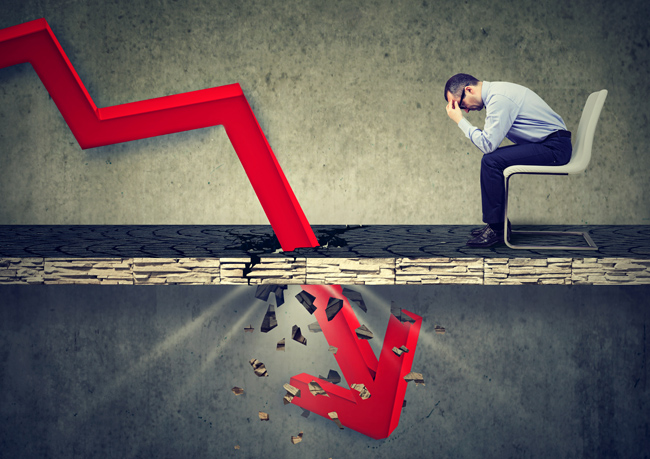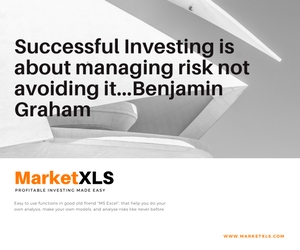Everyone says staying calm during the next stock market crash is critical. But how? Use these 5 mental tricks to make sure that you make money during the next stock market melt down.
I’ve read this statistic many times, but it still blows my mind every time. According to Dalbar, a financial research organization, over the last 20 years, the S&P 500 has returned an annual average of 7.68%, while the average individual investor has only gained a lousy 4.79%. This has been true even when investors put their money in an S&P 500 index fund, which should give investors almost exactly the same return as the index. The underperformance looks even worse when examined on shorter time periods. How could the average investor get such poor results? Dalbar attributes at least 50% of the shortfall to “psychological factors.” In a summary of the Dalbar report, Marketwatch.com author Lance Roberts summed up the naked truth, “the reality is that investor psychology is the biggest impediment to long term success.”
Everyone loves to buy and hold stocks when they are going up! Shucks, I put in ten dollars, and I get a nice dividend every quarter, and sometimes the price goes up just a little, sometimes it goes down a little, but sometimes it goes up a lot! But who likes to hold on during a crash? It’s no fun watching my $10 go down to $8, then suddenly to $6, then even to $4 and then….just sit there. Maybe for years. Most investors lack the patience, or the guts, or the whatever, to hold on during a crash. They know they SHOULD hold on. Every investment advisor and stock guru trots out reams of data and studies that show that long term investors do best when they wait out the storm. But somehow, the more people are assured that the crash is only temporary, the more panicked they become. Soon they sell at a loss just to make the panic stop. Such is the sad story of the typical investor who underperforms the benchmark, year after year, decade after decade.
Did it ever seem like the more someone tells you to “just calm down,” the less calm you feel? Did it ever seem like the more authorities and financial wiseman assure us that “everything is under control,” the less controlled the situation feels? Everyone knows that the best thing to do during a crash is NOTHING. But that is easier said than done! Here are some mental tactics that will help you master the art of stock market zen….
1. Flip the Script. It may be my ornery, contrarian nature, or I may just be a masochist, but I love it when stocks go down. My favorite companies are finally on sale!! The problem with most great companies with solid business advantages is that these advantages are obvious for all to see. So, during the long bull market I have had to carefully search for deals and steals, looking for value clues like a financial Sherlock Holmes. During a crash, great companies go on sale, no sleuthing required. Try this tactic. Right down a list of companies that you think have very solid, durable business models. Write down their price to earnings ratios. Then be patient, like a lion stalking its prey. Hunker down and wait. And wait. As the market starts to tank, and the folks on financial media begin to tie themselves in knots, watch the price to earnings ratio on those favorite stocks drop and drop. Ask yourself, “have the fundamentals of this business truly changed for the long term?” If not, then it’s time to buy. America’s financial house only catches on fire every great once in a while. But when it does, be prepared to the one running towards the flaming building while everyone else runs away.
2. Get a Life. Of course for some people the drama associated with a market crash is just too much. The frantic talking heads on cable news, the lame press conferences from government officials who attempt to project calm, the sour looks at high class dinner parties. If you think you may get rattled and do something rash, just sign off. I know quite a few successful investors who made it through the crash of 2008 and 2009 by just not looking at their portfolios. Except for the occasional check to make sure that everything looked normal with annual fees, etc, they just stopped logging onto Etrade, and they turned off the hysterics on cable news. Today they are much richer because of it.
Of course, this isn’t easy. Think about it this way. When you choose a stock, you are essentially hiring a competent (usually) very highly paid (almost always) management team to run your business for you. The corporate C -Suite minds the store so you don’t have to. Now, go to the beach, take up painting, start competitive rock climbing. Find something else to absorb your time and energy until the storm has passed. How many CEO’s do your portfolio companies need?
3. Go to Church. Buffett, Graham, Templeton, Lynch. These are the names of the patron saints of investing. Turn off the talking heads on CNBC and engross yourself in the sacred texts of stock market investing. In terms of convincing you to be a long term investor, I am just a guy with a website. Trust in Warren Buffet, who was consistently the world’s richest man for several decades. Uncle Warren brought us legendary sayings such as “Be fearful when others are greedy, and greedy when others are fearful” and, “if you don’t want to be a shareholder for 10 years, you shouldn’t be a shareholder for 10 minutes.” Just as religion can be a calming influence during times of trouble, let these “holy men” of outsized returns be your guiding light during times of market turmoil.
4. Get Nasty. This one is just downright mean, but it works. Just as the media enjoys spinning outrageous tales of extreme success during good times, they also love to publish, “how the mighty have fallen,” articles when Wall Street High Flyers come crashing down. However much money you fear you may be losing in the stock market, I promise you will find examples much, more worse than yourself. Did you open up your Etrade account this morning to find more red than an 80’s slasher movie? How would you feel if you were managing a billion dollars and your voicemail was full with frantic calls from panicking clients? Every ten years or so, some former Master of the Universe jumps out the window of his Manhattan office. As long as you are not the jumper, you are having a better day than him.
5. Get your MBA. Why is it that if someone pays more than $100,000 for a top MBA, they are considered wise, but if they lose $100,000 in the stock market, they are considered a fool? Don’t we always pay for our education, one way or another? As long as you stick to your guns during the worst of a crash, your losses will probably remain paper losses. But even if you do make some capital disappear, why not consider that money invested in your financial education? Let’s put it this way. Who do you think has more knowledge today? A freshly minted Harvard MBA, or an experienced stock investor who has ridden the ups and downs of several market booms and busts? Education is never really free; just consider the next thrashing you take to be the necessary price paid to acquire valuable knowledge.
Mastery of these tactics doesn’t come overnight. Some may work better than others for you. But once you survive your first crash, other future swoons will feel easier to navigate. As Ringo Starr once sang….
“You got to pay your dues if you wanna sing the blues…..
……And you know it don’t come easy….”







More Stories
J&J: THE NEXT ELI LILLY?
HOW TO INVEST $10,000 TODAY
CANCER VACCINES: AN INJECTION OF PROFIT FOR YOUR PORTFOLIO?